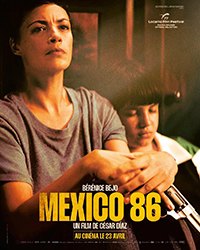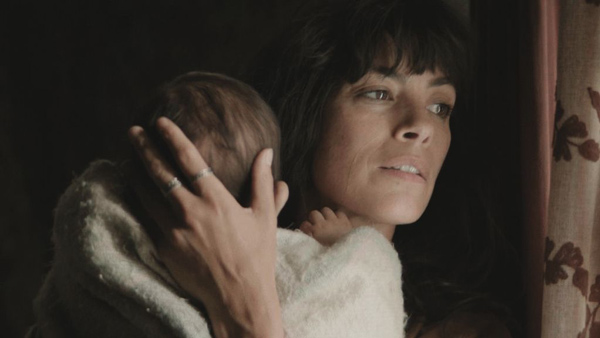Coup de Madre: Díaz Revisits Violent Turmoils with Intimate Familial Drama
 Director César Díaz continues his cinematic exploration of Guatemala’s brutal civil war, considered the bloodiest Latin American conflict in the Cold War era (which lasted thirty-six years, from 1960 to 1996) in his sophomore narrative feature, Mexico 86. As the title suggests, time and place format the specific realities of traumatic histories often conveniently ignored, despite the significant ripple effects which shaped the country and its citizens. Like his 2019 debut Our Mothers (which won the Camera d’or at the Cannes Film Festival), and two previous documentaries specifically grappling with Guatemala’s history, both then and now, Díaz focuses on the emotional impact of such histories with another example of children estranged from their parents thanks to violent, political contexts. Recruiting Bérénice Bejo to star as a Guatemalan revolutionary who must flee her native land and leave behind her infant son, Díaz hinges his latest on the choices and consequences specifically experienced by women forced to make impossible choices with this tale of a mother weighing her devotion to both her country and her son—an impasse which suggests inevitable tragedy.
Director César Díaz continues his cinematic exploration of Guatemala’s brutal civil war, considered the bloodiest Latin American conflict in the Cold War era (which lasted thirty-six years, from 1960 to 1996) in his sophomore narrative feature, Mexico 86. As the title suggests, time and place format the specific realities of traumatic histories often conveniently ignored, despite the significant ripple effects which shaped the country and its citizens. Like his 2019 debut Our Mothers (which won the Camera d’or at the Cannes Film Festival), and two previous documentaries specifically grappling with Guatemala’s history, both then and now, Díaz focuses on the emotional impact of such histories with another example of children estranged from their parents thanks to violent, political contexts. Recruiting Bérénice Bejo to star as a Guatemalan revolutionary who must flee her native land and leave behind her infant son, Díaz hinges his latest on the choices and consequences specifically experienced by women forced to make impossible choices with this tale of a mother weighing her devotion to both her country and her son—an impasse which suggests inevitable tragedy.
Guatemala, 1976. Maria (Bejo) clutches her infant son Marco to her chest, her husband’s murdered body lying on the streets below. An activist who’s part of a revolutionary group protesting the country’s corrupt dictatorship, she must now flee to Mexico for her own safety, forcing her to leave behind her child with her mother, Eugenia (Julieta Egurrola). A decade passes with Maria supporting her cause from afar, adopting a new identity as she works at a newspaper where she aims to motivate journalists to publicly criticize the Guatemalan government without revealing her personal motives. Just as she receives a secret document which would expose a cover-up regarding the slaughter of her country’s citizens, her mother arrives with Marco (Matheo Labbe) in tow. Eugenia is dying and she must leave Marco in Mexico to live with his mother, a woman he’s amicable with but doesn’t seem to know too well. This uprooting is both upsetting to him and his mother, who realizes the continuation of her mission will endanger her son’s life.

Only recently has Guatemalan cinema began to reassemble its prominence, with front runner Jayro Bustamente’s body of work (kicking off with 2015’s Ixcanul) finding acclaim at major international film festivals. With Mexico 86, Díaz solidifies himself on the same horizon, his terse title recalling Santiago Mitre’s Argentina, 1985 in returning to a specific moment. Though Díaz’s portrait is more nebulous than a laser pointed, distinguishing event, he conjures a precise perspective not often examined. In essence, his latest is a tale about two mothers and their significant sacrifices. Headlining the narrative is Argentinean-French actor Bejo, whose presence in a Spanish language production should make this automatically appealing (her last major production outside of France is the troubling and perverse The Quietude from Pablo Trapero in 2019). Bejo, donning a variety of wigs as she furtively carries out clandestine errands, can sometimes seem like a stylized femme fatale, but Díaz sidesteps such flourishes as we wade into emotionally murky territory. Bejo is joined by notable Mexican actress Julieta Egurrola (Arturo Ripstein’s Deep Crimson, 1996), her health being the dramatic catalyst which reunites Maria and Marco indefinitely.
While not including any specific timeline for Guatemala’s upheaval, we focus solely on an omnipresent threat which sometimes borders on hopelessness, both in relation to Maria’s survival and her inability to effectively communicate with her son for his own safety. She’s supported by devoted lover Miguel (Leonardo Ortizgris, who appears in Alonso Ruizpalacios’ first two features, Gueros and Museo), but they never seem too far ahead of the secret police tailing them. Of course, this culminates in her manipulation of a Mexican newspaper she must somehow convince to publish a dossier of victims the Guatemalan government would rather keep secret, but her son’s safety imperils the operation, both by her enemies and her revolutionary colleagues who insist he be transported to Cuba to be raised by one of their cell groups. Her plight allows the film to operate in the realm of genre and melodrama, like La Femme Nikita (1990) meets Running on Empty (1988). The result is a film which feels anxiety laden and compassionate while also reflecting on the terrors of the past and the countless individuals who never received their reckoning.
Reviewed on August 10th, 2024 – at the 77th edition of the Locarno Film Festival — Piazza Grande section. 93 Mins.
★★★/☆☆☆☆☆


